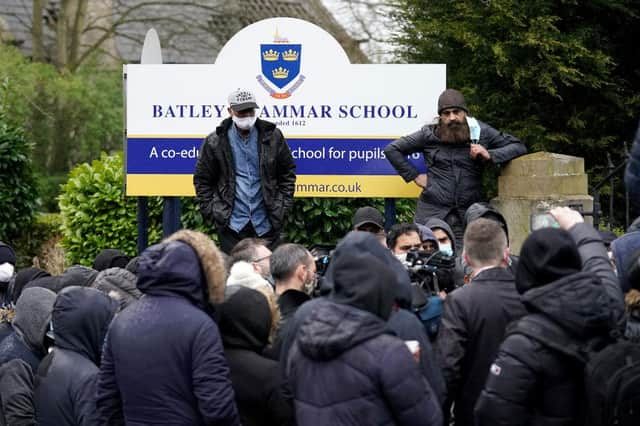Why are images of Prophet Muhammad offensive to Muslims? Protest at Batley school explained
This article contains affiliate links. We may earn a small commission on items purchased through this article, but that does not affect our editorial judgement.


A school in West Yorkshire has been the site of angry protests after a teacher showed pupils an apparent depiction of Muhammad.
Batley Grammar School have “unequivocally apologised” and suspended the teacher involved.
Advertisement
Hide AdAdvertisement
Hide AdThe depiction of the faith’s holiest prophet is deemed offensive by most Muslims.
But the protests have been met with opposition with Communities Secretary Robert Jenrick saying that the protests were “not right”.
Here’s what has happened in Batley - and why the depiction of Muhammad is forbidden.
What is happening in Batley?
Protestors have been gathering outside Batley Grammar School in Batley, near Bradford, West Yorkshire for two days.
Advertisement
Hide AdAdvertisement
Hide AdIt follows claims a member of staff had shown students a cartoon, widely reported as taken from the French satirical newspaper Charlie Hebdo, deemed offensive to the Islamic faith during a religious studies lesson this week.
On Thursday, the school “unequivocally” apologised for showing “totally inappropriate” material to children, and said a member of staff was suspended pending an investigation.
A protester speaking “on behalf of the Muslim community” read out a statement outside of the school on Friday, in which he said: “The teachers have breached the position of trust and failed their duty of safeguarding, and this issue must be addressed as a matter of urgency.
“We do not accept that the school has taken this issue seriously, given that it’s taken them four days to merely suspend only one of the teachers involved.”
Advertisement
Hide AdAdvertisement
Hide AdHe called on the entire British Muslim community to review the materials being taught in their children’s schools.
One protester whose children attend the school, who only wanted to be identified as Mr Hussain, told the PA news agency: “What people are trying to convey here to the media and to the British public at large is we would not like any form of extremism, any extremist viewpoints, to be taught to children.”
He said the western world “is at a loss in understanding the reaction” from the Muslim community when the Prophet Mohammed is “insulted in any way, shape of form”.
Why are depictions of the Prophet Muhammad offensive to Muslims?
Advertisement
Hide AdAdvertisement
Hide AdThe majority of Muslims say that pictorial depictions of the Prophet Muhammad are forbidden.
There is no explicit command to avoid depicting the religion’s holiest prophet, but supplemental teachings, or ahadith, claim that depictions of Muhammad are a form of idolatry.
In Islam the deification of anything other than God is deemed as “shirk” or a form of idolatry. The portrayal of God as a human is also forbidden
It is believed by some scholars that these teachings were in reaction to Christianity’s deification and worship of Jesus as a God.
Advertisement
Hide AdAdvertisement
Hide AdIn recent years, offensive depictions of Muhammad, such as the Charlie Hebdo portrayal of the prophet have been viewed as a direct attack on Islam and a form of blasphemy.
Speaking to CNN in 2015 Hussein Rashid, a professor of Islamic studies at Hofstra University in New York explained the outraged reaction to offensive portrayals of Muhammad.
"In the context of Europe, where in many countries Muslims feel like they are besieged, these images are not seen as criticism but as bullying," said Rashid. "Violence as a response is clearly wrong and disproportionate. However, it is not so much about religious anger as it is about vengeance."
Speaking to Vox in 2015 Dalia Mogahed, the director of research at the Institute for Social Policy and Understanding, compared a Muslim defending the prophet to an American protecting the US flag.